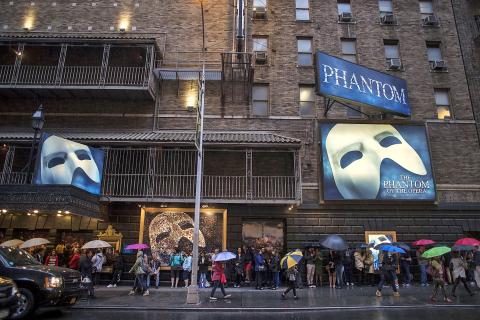Hsieh Shu-wen (謝淑文) thought that being stage manager for The Phantom of the Opera musical would be a great professional opportunity. She never thought she’d walk away from the production a week before opening night because the company that was staging the production had yet to secure the performance rights.
“I have to protect my professional reputation,” Hsieh says.
Brook Hall, founder of The LAB Space theater group, says that staging performances without first acquiring the copyright is an endemic problem in Taiwan.

Photo: Bloomberg
Hall, who has over 16 years experience in Taiwan’s performing arts industry, says that he has seen “extremely egregious violations by some of [Taiwan’s] biggest [theater] companies.”
These illegal productions, known as “pirate shows,” damage Taiwan’s reputation in the performing arts world, Hall says, citing as additional examples a 2013 production of Hello Dolly by Godot Theater Company (果陀劇團) and several productions of How I learned to drive.
THE PHANTOM’S MENACE
The Taiwan Federation of Literary and Art Circles’ (台灣文學藝術家協會) production held last month at Taipei’s Zhongshan Hall (中山堂) was advertised as a performance of the full original The Phantom of the Opera musical.
Spokesperson Yue Hong (樂紘), says they applied for the rights to perform the songs in public with the relevant licensing agency, believing that was all that would be needed to perform the full musical.
Chiu Hsiu-jhu (丘秀珠) of the Music Copyright Association of Chinese Taipei (MUST, 社團法人中華音樂者作權協會) says that her organization issued the federation with public performance rights for nine songs at the end of August, but “didn’t state clearly at the outset what kind of performance they intended to hold.”
Chiu says over the following weeks, the federation continually applied for more songs, securing the rights of 21 of them by Sept. 25.
After being told by Hall that they must apply for grand rights in order to stage the full production, Hong’s group contacted Andrew Lloyd Webber’s London-based Really Useful Company, which controls the rights to the musical version of The Phantom of the Opera.
Hong says the company refused to grant the grand rights and sent a cease-and-desist letter warning against any use of the show’s official logo.
Unable to legally stage the musical, the federation rewrote the show less than two weeks before opening night, performing royalty-free opera arias instead.
‘WILLFUL IGNORANCE’
“There is a lack of awareness about rights here,” says Lin Chuan (林川), a Hong Kong acting coach who has been working in Taiwan for eight years.
Lin adds that, like the case with the Taiwan Federation of Literary and Art Circles, many theater companies begin rehearsing a show and only seek out the performance rights later on.
“I suspect there is willful ignorance on the sides of both production companies and local small rights licensing agencies,” says Hall, adding that applying for the rights of individual songs is a fraction of the cost of grand rights.
Hall aims to address this pervasive issue by holding an open seminar next week at the Taiwan Performing Arts Council in Shilin District (士林), where he will be explaining the norms and laws of licensing for different kinds of shows.
“Everyone needs to know the proper procedure,” he says.

In the March 9 edition of the Taipei Times a piece by Ninon Godefroy ran with the headine “The quiet, gentle rhythm of Taiwan.” It started with the line “Taiwan is a small, humble place. There is no Eiffel Tower, no pyramids — no singular attraction that draws the world’s attention.” I laughed out loud at that. This was out of no disrespect for the author or the piece, which made some interesting analogies and good points about how both Din Tai Fung’s and Taiwan Semiconductor Manufacturing Co’s (TSMC, 台積電) meticulous attention to detail and quality are not quite up to

April 21 to April 27 Hsieh Er’s (謝娥) political fortunes were rising fast after she got out of jail and joined the Chinese Nationalist Party (KMT) in December 1945. Not only did she hold key positions in various committees, she was elected the only woman on the Taipei City Council and headed to Nanjing in 1946 as the sole Taiwanese female representative to the National Constituent Assembly. With the support of first lady Soong May-ling (宋美齡), she started the Taipei Women’s Association and Taiwan Provincial Women’s Association, where she

Chinese Nationalist Party (KMT) Chairman Eric Chu (朱立倫) hatched a bold plan to charge forward and seize the initiative when he held a protest in front of the Taipei City Prosecutors’ Office. Though risky, because illegal, its success would help tackle at least six problems facing both himself and the KMT. What he did not see coming was Taipei Mayor Chiang Wan-an (將萬安) tripping him up out of the gate. In spite of Chu being the most consequential and successful KMT chairman since the early 2010s — arguably saving the party from financial ruin and restoring its electoral viability —

It is one of the more remarkable facts of Taiwan history that it was never occupied or claimed by any of the numerous kingdoms of southern China — Han or otherwise — that lay just across the water from it. None of their brilliant ministers ever discovered that Taiwan was a “core interest” of the state whose annexation was “inevitable.” As Paul Kua notes in an excellent monograph laying out how the Portuguese gave Taiwan the name “Formosa,” the first Europeans to express an interest in occupying Taiwan were the Spanish. Tonio Andrade in his seminal work, How Taiwan Became Chinese,